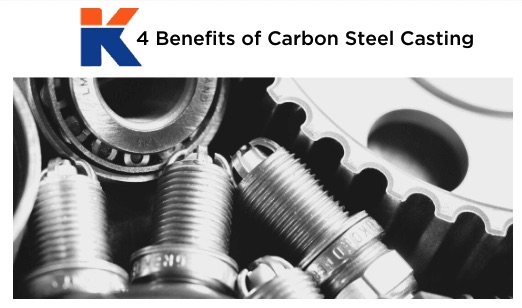4 Benefits of Carbon Steel Casting
Carbon steel is a popular material option for steel castings because of its cost-effectiveness, wear resistance, and machinability. Carbon steel casting applications are endless; they serve the automotive, railway, heavy equipment industries, and more.
Carbon steel is particularly useful for motor and electrical appliances due to its ferromagnetic properties. It is a safe, durable alloy with a high level of structural integrity; all features that contribute to it being one of the most popular alloys in the world. Steel is also one of the most recycled materials on the planet, making it an attractive material for companies with sustainable goals.
There are a number of benefits to utilizing carbon steel casting and low alloy steel casting, but the following four advantages of carbon steel casting apply to industries that are looking for cost-effective materials without sacrificing quality and durability:
-
-
- Cost-effective mechanical parts
- Multiple material grades to fit any application
- End of life recyclability
- High structural integrity
- Cost-effective mechanical parts
-
Learn more about the benefits of using carbon steel as a casting material:
Cost-effective
Carbon steel is much cheaper than stainless steel and just as durable. Carbon steel is readily available and can integrate with one or more alloying elements, making them easy to customize. Carbon steel parts can be made very thin, keeping costs down by using less material.
Multiple Material Grades to Fit Any Application
Carbon steel is commonly broken down into three grades:
Low-carbon steel (mild steel): Low-carbon steel will typically consist of 0.04% to 0.3% carbon. Depending on the properties needed, this grade type can be made with certain elements that increased or added. It is characterized by low hardness and cost, high ductility, toughness, machinability, and weldability.
Medium-carbon steel: This grade of carbon steel will contain between 0.31% and 0.6% carbon, plus 0.06% to 1.65% manganese. It is stronger than low-carbon steel, but much harder to form, weld, or cut. It is often hardened and tempered via heat treatment. It is characterized by low hardenability, medium strength, ductility, and toughness.
High-carbon steel: High-carbon steel is commonly known as “carbon tool steel.” This grade of carbon steel usually has a carbon range between 0.61% and 1.5%. It is very difficult to bend, weld, or cut. Once it has been heat-treated, it becomes very hard and brittle. It is characterized by high hardness, strength, and low ductility.
Due to the diversity of the grades of carbon steel, it can be used in numerous industries in multiple applications, allowing for scalability and expansion of offerings—and profits.
Low-carbon steels are often used in automobile body components, structural shapes (I-beams, channel and angle iron), pipes, construction and bridge components, and food cans.
As a result of their high strength, resistance to wear and toughness, medium-carbon steels are often used for railway tracks, train wheels, crankshafts, and gears and machinery parts requiring this combination of properties.
Due to their high wear-resistance and hardness, high-carbon steels are used in cutting tools, springs high strength wire and dies.
More industries + more applications mean a wider offering of products and opportunities for growth.
End of Life Recyclability
Tool steel, spring steel, and cast steel are all very recyclable, especially in the scrap metal market. Carbon steels are also common materials for mechanical parts, making them a widely used material in high-quantity applications.
High Structural Integrity
Due to its high structural integrity, carbon steel castings are more durable, safer and less likely to experience a failure due to tolerance capabilities. The strict tolerances for carbon steel investment casting can produce precise replications for high-production orders.
All of these advantages of carbon steel casting can be narrowed down to one word: savings. Whether it is saving on materials or parts costs, less machining time required, fewer man-hours or fewer repair costs due to a loss of structural integrity—carbon steel casting represents an overarching process to save end-users money within the right applications. Contact a KICastings Expert today to find out if carbon steel is the right choice for your next project.


